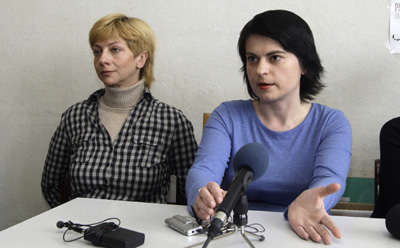They are both being held for a fourth consecutive day at the detention center of the Belarusian security service, the KGB, in Minsk, the site said. Today CPJ tried to clarify the exact legal status of both journalists. CPJ’s calls to GUVD went unanswered. The officer on duty at the KGB who received CPJ’s call refused to identify himself and denied the two were in custody. CPJ was able to reach Charge d’affaires a.i. Oleg Kravchenko at the Belarusian Embassy in Washington, who told CPJ he could not comment on individual cases and specific charges.
Radina and Khalip were arrested along with about 20 other journalists who were covering post-election protests in Minsk on Sunday and Monday.
“We call on Belarusian authorities to release Natalya Radina and Irina Khalip at once,” CPJ Europe and Central Asia Program Coordinator Nina Ognianova said. “Both were doing their job, covering a demonstration in Minsk.”
Khalip was beaten and forcibly taken by riot police while on the air with the independent Russian radio station Ekho Moskvy on Monday morning. Her husband, opposition presidential candidate Andrei Sannikov, was also beaten and arrested. Amnesty International reported today that Sannikov’s lawyer told the group his client has been tortured in KGB detention; his legs appear to be broken, the way he speaks and holds himself indicates he may have suffered brain damage, and he is in urgent need of medical attention. Khalip’s and Radina’s health conditions remain unknown.
Radina was arrested on Monday when special forces stormed Charter 97‘s office and took her and the three volunteers in the newsroom that morning. The volunteers, who have not been identified, were later moved to a different detention center and sentenced to 10 days in jail for “participating in an unsanctioned rally,” BelaPAN news agency reported on Tuesday.
Protesters denounced the Election Commission’s preliminary results Sunday declaring Lukashenko the winner with almost 80 percent of the vote. On Monday, observers with the Organization for Security and Co-operation in Europe criticized the lack of transparency in the vote count and the government crackdown on journalists and opposition activists in its aftermath.
